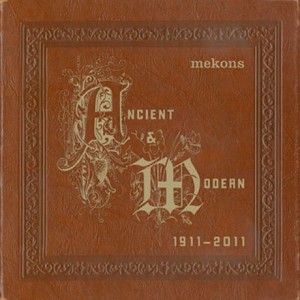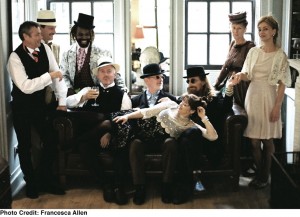Riffs, Rants & Rumors: The Mekons Rewrite History on 'Ancient & Modern'
posted in: Artist Features • Features • Music News • Rock
 The Mekons have been around long enough to have a sense of history that matches their perspective as first-generation punks”Jon Langford and Tom Greenhalgh co-founded the band during punk’s 1977 Summer of Hate and are still sparking the Mekons’ mix of arty lyrics, provocative politics and punky attitude today. But even for a band with thirty-four years in the rearview mirror, the suffix of the title Ancient & Modern: 1911-2011”the Mekon’s latest album”sounds a bit ambitious in its scope. Since the ˜80s, the band has increasingly filtered its own punk-poet roots through traditional, rootsy influences like folk and country, and that sensibility serves them well as they cast their artistic eye to an era well before their own individual lifetimes.
The Mekons have been around long enough to have a sense of history that matches their perspective as first-generation punks”Jon Langford and Tom Greenhalgh co-founded the band during punk’s 1977 Summer of Hate and are still sparking the Mekons’ mix of arty lyrics, provocative politics and punky attitude today. But even for a band with thirty-four years in the rearview mirror, the suffix of the title Ancient & Modern: 1911-2011”the Mekon’s latest album”sounds a bit ambitious in its scope. Since the ˜80s, the band has increasingly filtered its own punk-poet roots through traditional, rootsy influences like folk and country, and that sensibility serves them well as they cast their artistic eye to an era well before their own individual lifetimes.
 According to drummer Steve Goulding, who has been manning the Mekons’ throne for over a quarter-century now, Ancient & Modern is concerned with that last fading of one kind of way of life, and that descent into war¦the end of the ninteenth century and the beginning of the twentieth century, the whole Edwardian era. It’s supposed to convey that kind of atmosphere. Pretty much everything in all the songs is concerned with that era. It’s an era of prosperity and ease of living that was fading away and descending into chaos. The trade unions are rising and there’s war all over the world, all the old certainties are slipping away. He adds laughingly of the band members, who are now in their 50s, In our case, all the old chords are slipping away too.
According to drummer Steve Goulding, who has been manning the Mekons’ throne for over a quarter-century now, Ancient & Modern is concerned with that last fading of one kind of way of life, and that descent into war¦the end of the ninteenth century and the beginning of the twentieth century, the whole Edwardian era. It’s supposed to convey that kind of atmosphere. Pretty much everything in all the songs is concerned with that era. It’s an era of prosperity and ease of living that was fading away and descending into chaos. The trade unions are rising and there’s war all over the world, all the old certainties are slipping away. He adds laughingly of the band members, who are now in their 50s, In our case, all the old chords are slipping away too.
The Mekons, whose last album was 2007’s acoustic-based Natural, cloistered themselves away to come up with the tracks for Ancient & Modern. We rented a cottage in Devon so we could be near where Tom lives, says Goulding. He came every day after work and we would sit around the living room and set up recording facilities and just bash away from morning till night. The actual lyrical ideas developed sort of in tandem, but they were refined over a period of months afterwards. Tom’s ˜I Fall Asleep,’ which is more of a Victorian parlor ballad, we did at the time. But stuff like ˜Space in Your Face,’ the lyrics were done a long time afterwards. I think we had a general idea of what we wanted it to be, but it became more specific after a while.
 Besides the determinedly anachronistic concept, one of the things about Ancient & Modern that differs from most of the Mekons’ output is that it’s their first album since 1986 to be released on their own, newly revived Sin Records imprint. The major impetus was apparently the downfall of their longtime label Touch & Go, but Goulding adds, I think it was about time. Because nobody else wanted to put it out, which was kind of the position we were in for the first album I did with the Mekons, the Fear and Whiskey album, that was on Sin. Of course, the label-hopping the band has done over the years”they’ve been on everything from Twin-Tone to A&M”has never kept them from the hitting the road to reach their rabid cult of camp followers. We’ve got two tours coming up, Goulding says, we’ve got one over here and one in Europe. The one over here starts in San Francisco on September 30, where we play the Hardly Strictly Bluegrass Festival. And the onset of middle age doesn’t seem to have dimmed the band’s appetite for action a bit. We play in Philadelphia and in Brooklyn on the same day, Goulding explains, we do [Philly-based radio show] World Café in the afternoon and [New York club] The Bell House in the evening of October 7.
Besides the determinedly anachronistic concept, one of the things about Ancient & Modern that differs from most of the Mekons’ output is that it’s their first album since 1986 to be released on their own, newly revived Sin Records imprint. The major impetus was apparently the downfall of their longtime label Touch & Go, but Goulding adds, I think it was about time. Because nobody else wanted to put it out, which was kind of the position we were in for the first album I did with the Mekons, the Fear and Whiskey album, that was on Sin. Of course, the label-hopping the band has done over the years”they’ve been on everything from Twin-Tone to A&M”has never kept them from the hitting the road to reach their rabid cult of camp followers. We’ve got two tours coming up, Goulding says, we’ve got one over here and one in Europe. The one over here starts in San Francisco on September 30, where we play the Hardly Strictly Bluegrass Festival. And the onset of middle age doesn’t seem to have dimmed the band’s appetite for action a bit. We play in Philadelphia and in Brooklyn on the same day, Goulding explains, we do [Philly-based radio show] World Café in the afternoon and [New York club] The Bell House in the evening of October 7.
Besides the support of a small-but-hardy coterie of fans, the continuing admiration of an overwhelming number of critics”including such high-placed tastemakers as Greil Marcus”has helped to keep the Mekons’ flame burning. Asked about the reason for music journalists’ perennial fascination with the band, Goulding offers, Maybe it’s because we actually take trouble to try and make things about something. We have some good writers in the band that actually have something to say artistically. It’s like with Tom’s thing ˜I Fall Asleep,’ I think that’s beautiful, and it really does conjure up a certain sensibility. The images of the sea and the rooftops of London, that whole thing, it’s just very well written. You don’t hear stuff like that, people don’t really do that, because it’s not commercially successful, and we do it because we don’t care if we’re commercially successful or not. We’re kind of fatalistic about it, we don’t bother taking that into consideration, and I think that makes things a lot more interesting.
